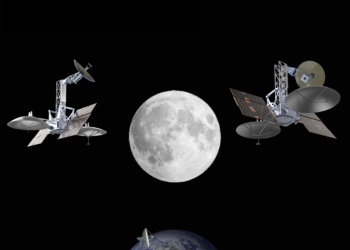Excalibur Almaz emerges as Sea Launch’s main benefactor
SatelliteFinance has learned that, contrary to previous reports, Space Launch Services, the provider of US$25m of debtor-in-possession financing to Sea Launch, is not a dual consortium.
It had been thought that SLS was an entity set up by PlanetSpace and…
SatelliteFinance has learned that, contrary to previous reports, Space Launch Services, the provider of US$25m of debtor-in-possession financing to Sea Launch, is not a dual consortium.
It had been thought that SLS was an entity set up by PlanetSpace and Excalibur Almaz, but a senior figure at Excalibur Almaz has told SatelliteFinance that PlanetSpace is not actually involved in SLS or Sea Launch at all.
David Warden, Vice President for Plans and Policies at Excalibur Almaz, said: “PlanetSpace did approach us, but they did not bring anything to the table. They refused to contribute to the DIP financing, so we didn’t think there was any point in giving up any equity in SLS.”
SLS has effectively been set up by Excalibur Almaz as a vehicle to ease the process of DIP funding to Sea Launch, which is currently in Chapter 11 bankruptcy protection. Warden said that it was likely SLS will be folded back into Excalibur Almaz once Sea Launch has exited Chapter 11.
He also went on to explain why Excalibur Almaz, which is developing a re-usable crewed entry vehicle capable of low earth orbit (LEO) flight, has committed to Sea Launch.
“The objective of Excalibur Almaz is to get into the commercial orbital space business,” he said. “We have field tested a spacecraft. What it needs is a launch vehicle to carry it. There are other launchers out there in Proton and Soyuz, but we feel bringing a launch vehicle like Zenit in-house would be more advantageous to us.”
Warden stressed that Sea Launch will continue to serve the commercial market when it exits Chapter 11. “It would make no sense for it to be exclusive, as we are still probably three years away from having LEO cargo capability,” he said.
In addition to deploying Sea Launch in its usual geostationary orbital launch areas, Excalibur Almaz’s investment in the company should also open it up to US government contracts. To bid for these a company needs to be at least 51% owned by a US-based entity, which in this case would by through Exalbur Almaz’s American registered operations.
Excalibur Almaz is a private company, and Warden could not divulge any information about the identity of its shareholders or the source of their funding, except to say that it has no difficulties in freeing up the fund to supply Sea Launch with DIP financing and to eventually take a stake in the company once exit financing has been complete.
Exit financing negotiations are ongoing, and Excalibur Almaz is in talks with other parties interested investing in the process. Warden said that though half a dozen parties have registered interest, there are two in particular that are very close to committing to an exit financing plan.
“There are two that are really interested and have been doing due diligence for a number of weeks now,” he said. “One is very experienced in that sector. The other is not so experienced but they are very smart people and are rapidly learning.”
Given that these talks are still in progress, Excalibur Almaz has not yet defined exactly how big the stake it will take in Sea Launch will be.
Of Sea Launch’s current partners, Warden said that Norwegian shipping company that built the launch platform was unlikely to have much interest going forward but that Ukrainian rocket manufacturer Energia and Boeing would still retain an interest.
Boeing has publicly stated that it will no longer inject any more funds after it was left liable for US$448m in secured debt obligations when Sea Launch filed for Chapter 11 protection last year.
However, Warden pointed out that Boeing has an interest in keeping the company going because it also still has large unsecured debts owed to it by Sea Launch, which it will be unlikely to recoup as and when Sea Launch comes out of bankruptcy. He stated that even liquidation would only be likely to provide Boeing with paltry returns of two cents on the dollar or less.
“When you weight that against forward contracts, which include satellite fairing work and US$8-10m per launch, that’s not a bad outlook for them,” he said.
The situation is similar for Energia, which builds the Block D third stage of the Zenit rocket. Excalibur Almaz is looking to keep Energia involved not only as suppliers but as holders of a small equity stake in Sea Launch.
Warden estimates that Sea Launch requires E100m investment to restart its commercial operations. Excalibur Almaz is targeting an exit of chapter 11 in May or June this year, with a return to launch missions in the first quarter of 2011.
“What crushed Sea Launch fundamentally was servicing its debt load,” said Warden. “We can make it profitable going forward just through the satellite launch business and a lowering of that debt load.”








